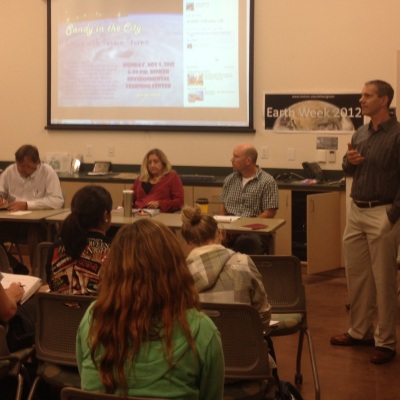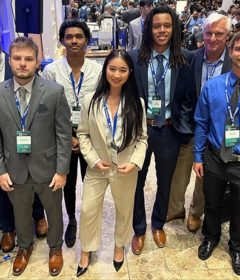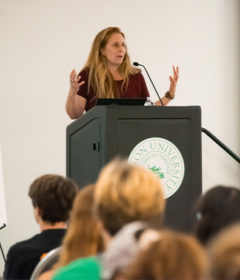In the wake of severe storms

In the wake of Hurricane Sandy’s torrent through the Northeastern United States last week, New Jersey Governor Chris Christie told reporters that he did not “give a damn” about presidential politics. Instead, his mind was set on helping those citizens most affected by the flooding, destruction, and power outages that the storm had left behind.
That same seriousness and sense of urgency were present in the Nov. 5 flash forum that Stetson University hosted for the university community and the public in Stetson’s Rinker Environmental Learning Center. The panel consisted of four professors in Stetson’s Department of Geography and Environmental Science, and one from the Political Science Department. Each gave his or her unique perspective about Hurricane Sandy and the broader topic of climate change. Topics, ranging from public policy, environmental law, biological diversity, and politics, were all part of a highly informative yet understandably bleak discussion about the future of climate change in the United States and the rest of the world.
Geography and Environmental Science Department Chair Tony Abbott began the event by giving a brief overview about the nature of hurricanes, and why warmer oceans fuel hurricane power. This means that hurricanes will continue to travel further north every year, he explained, to the point where Great Britain might even begin to feel the brunt of these storms.
Visiting Professor John Jett used his opening statement to detail the worrisome situation in New Jersey and New York, where large amounts of plastic and chemical waste from land has washed back into the ocean. The fact that much of the petrochemical industry in the region is now underwater does not bode well for the marine life in the Atlantic Ocean.
Visiting Professor Barbara Bischof discussed addressing global climate change in terms of risk versus cost, and warned of the huge price mankind will pay if no serious action is taken with regards to the warming planet.
Visiting Professor Clay Henderson, the 2012 recipient of Stetson’s esteemed Hood Award, told of his recent travels to Malawi, a country that feels the effects of climate change more intensely than most. Henderson noted that a storm like Hurricane Sandy might help people understand the seriousness of climate change, considering that over half of the American population lives within 50 miles of the coast (NOAA).
Political Science Visiting Professor Jim Buthman stressed the need for a greater dialogue when it comes to climate change. Buthman discussed the political hurdles that keep us from seriously addressing climate change on a policy level in an impassioned and articulate manner. In fact, each speaker was highly driven to have climate change become a subject of discussion on the national stage.
On a day when most news was about the impending national election, Stetson University hosted a nuanced and critically important discussion about various topics in the context of climate change. This came as a stark contrast to the ‘climate silence’ that was evidenced from all three Presidential debates. It certainly begs the question of what we should be talking about as responsible Stetson students, Americans, and citizens of the world.
by Kai Eckenrode ’13
Communication & Media Studies major
Editor, stetsongreen.tumblr.com



